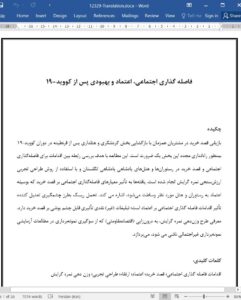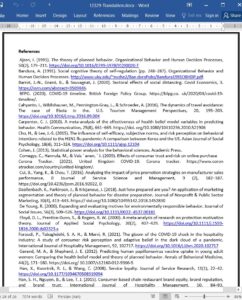Abstract
With the tourism and hospitality sector reopening post-lockdown of COVID-19, the recovery of customers' purchase intentions is essential to reboot the sector. This study aims to examine the relationship between social distancing measures and purchase intentions in the UK's restaurant and hotel sectors using a propensity score weighting experimental design method. The findings suggest that the impact of social distancing measures on purchase intentions is mediated by the trust in the targeted restaurant and hotel. Risk tolerance significantly moderates the influence of social distancing measures on trust; (non-) cash promotions have an insignificant impact on purchase intentions. The introduction of the propensity score weighting scheme addresses the endogeneity caused by the sampling bias in non-probability sampling experiment studies.
6. Conclusions
The hospitality industry is a highly contact-intensive service industry where the interaction between the customer and provider is inevitable, and thus the government lockdown policy has affected the industry greatly. To our best knowledge, at the time of writing, this is the first attempt to investigate the impact of the social distancing measures on the purchase intention of customers in the post-COVID-19 period, especially in the context of hospitality. Surprisingly, the direct effect between the two variables was significant but marginal in the restaurant sector and insignificant in the hotel sector. The finding suggests that the influence of social distancing measures on purchase intentions is dominant by the mediating effect of the trust in the targeted restaurant or hotel. This means that only the customers’ trust to the hospitality service providers that ensure social distancing measures will increase their purchase intentions as the presence of social distancing measures reduces their level of perceived risk. A finding that has contradicted our expectation is that promotion strategies do not moderate the relationship between social distancing measures and purchase intentions. This indicates that when the hospitality market reopens, the presence of social distancing measures in hospitality businesses is a more effective intervention than promotion strategies to reboot the industry and rebuild customers’ trust. In addition, it can be argued that promotion strategies are not closely associated with an individual’s perceived risk. Given the circumstance, the findings infer that a consumer’s purchase intention depends on the level of perceived risks (i.e. the presence or absence of social distancing measures in the service provider) and the trust to that service provider.










